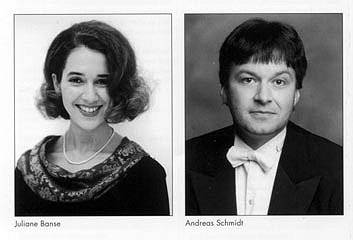This is an auspicious Volume One. Brahms might have composed nearly as many
songs as Schubert, but he was notoriously self-critical and pruned them
rigorously. There are some 200 solo songs extant, composed almost continuously
from 1851-88, plus many duets and vocal quartets. These early examples from
1853-58 are rarely heard, undeservedly so. For his texts, Brahms sought poems
which offered musical opportunities for enhancement, often conventional ones
rather than masterpieces. Schumann encouraged the young Brahms to publish
and he showed early an ability to transcend texts with his music.
Op 3 no 1 demonstrates unusual thematic concentration for songs of the time,
and no 2 quite complex contrapuntal intertwining of musical lines. Op 6 no
1 is a straightforward setting of In dem Schatten meiner Locken, made
so memorable in Wolf's later version. In these early sets there are a number
of folk songs including a Scottish murder tale with strongly dotted accompaniment
(Op 14 no 3).
[Pict of singers]Heard without scores, these were entirely convincing
performances. Both singers make the most of their opportunities. Juliane
Banse is a protegé of Brigitte Fassbaender, and shared her last
London appearance before she suddenly retired. I heard her at the Wigmore
Hall and am impressed with the development shown in these performances. A
lovely voice in perfect control. Andreas Schmidt has a good range
of expression in the masculine songs. Sympathetic accompaniment by the very
experienced Helmut Deutsch, who has accompanied many of the great
names of recent times - my only slight regret is that the piano tone is not
a little brighter. Full documentation in a 44-page booklet, with an illuminating
essay by Peter Jost, full texts and English translations, printed clearly
on thin, strong paper (which should be used for CD inserts more often). I
look forward to further releases in this series.

Reviewer
Peter Grahame Woolf

